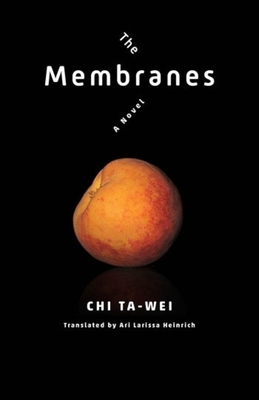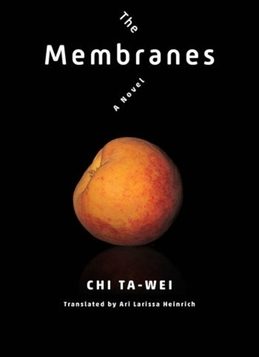 THE MEMBRANES
THE MEMBRANES
by Chi Ta-wei
Translated by Ari Larissa Heinrich
Columbia University Press. 168 pages, $17.
A MEMBRANE is by definition a barrier. The word evokes translucence, thinness: the pale casings of a sausage, perhaps, or the uncanny blink of a nictitating membrane over the eye of a reptile or a bird. Its fragility is a part of what both fascinates and repels us, alternately inviting us to break through the membranes and to leave them resolutely intact. In Chi Ta-wei’s classic Taiwanese science fiction novel The Membranes—first published in 1996 and translated into English in 2021—the tension between the desire to remain safe inside a membrane and the yearning to break free of it fuels the plot.
Momo, the novel’s protagonist, is first presented as a “dermal care technician,” a kind of æsthetician, who made a name for herself as the enigmatic owner of Salon Canary. Her signature product, M Skin, is a kind of smart membrane applied directly to a client’s skin, so that it forms an imperceptible barrier against damage and the elements. Clients love it because it makes them look young and fresh, but they remain unaware of the extraordinary amounts of very personal data the M skin logs. Scratches, caresses, showers, sexual encounters—the M skin logs it all, and Momo sees it all after removing the M skin and analyzing it with a computer. In our increasingly tech-mediated, biotechnology-invested world, M Skin seems at once a security disaster waiting to happen and a capitalist inevitability. However, as a writer, Chi Ta-wei is far less interested in the economics of this new technological development than in its metaphorical implications and the narrative possibilities it presents. If our lives are defined by barriers, Ta-wei seems to ask, if it becomes impossible for us to truly connect with others or with ourselves, what might we become? A necessary (and chilling) follow-up to that question is: what might society do to us? The world of The Membranes is familiar to us in 2021 but was quite prescient in 1996. In this version of Earth, the planet has been ravaged by climate change, humans have retreated to domes under the ocean, cyborgs have become cheap labor, and giant media conglomerates control what information we have access to in our day-to-day lives. Everyday life in this world is not depicted as soulless or frightening, however. Instead, it’s full of beauty, heartbreak, ambition, bitterness—all the stuff we know to be part of the human experience. Momo begrudges her mother her high-powered publishing job and the long hours she must, therefore, spend away from her daughter. In particularly affecting scenes, Momo, then a young boy, spends several years in isolation in a hospital, seeing her mother only rarely and through glass barriers, before a surgery combines what is left of her body with that of a cyborg (or so readers are led to believe). In a novel that features futuristic technology, climate apocalypse, and a philosophical plot twist even the translator likens to The Matrix, the fundamental queerness of the narrative remains central to understanding the work. Although Momo does not refer to herself as transgender (or, notably, have an opportunity to consent to the childhood surgery that includes a gender reassignment), her examination of the barriers between the self and the Other will be familiar to contemporary queer readers. Her mother’s narrative—of having a child with the woman she loves, then raising that child on her own after the breakup—proves quietly poignant and primes readers for the last twist despite Momo’s initial animosity. In the end, The Membranes presents a future where possibility is not defined only by technologies and economics, where gender is fluid, families are chosen, and the narratives we construct for ourselves are part of what makes us human.
____________________________________________________
Ruth Joffre is the author of the short story collection Night Beast.





